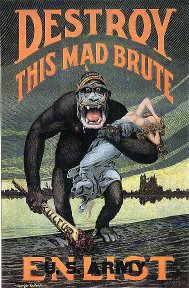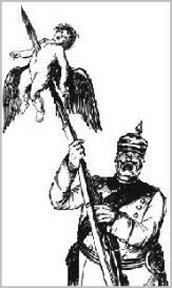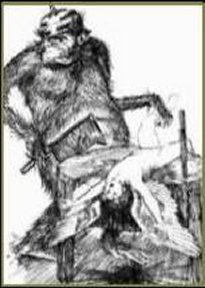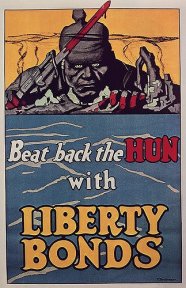Somewhere in France is a little village, one
of many through which the victorious Germans swept in their famous drive
on Paris and through which a few weeks later they were swept back by the
glorious troops of the tri-colour. Jeanne had watched them come, as she
had watcher her own beloved troops file through the narrow street beneath
her window in orderly retreat. Company after company, they camel battalion
following battalion, regiment upon regiment; divisions, army, army corps,
armies -- a huge,, hideous grey snake winding through the tortuous village
street, its poison fangs bared against the heart of France that later it
might wind its folds about a world.
To Jeanne the great snake represented only a menace
to her beloved France -- to her simple childlike mind there was no personal
menace in these thousands of men from a nearby country. They were fathers,
sons, brothers -- they were cultured, educated, refined. She hated them,
it is true, but she did not fear them. She knew that should the fortunes
of war throw French troops into Germany the German women would doubtless
hate the invader; but they would not fear him, and so she did not fear
the Germans. But that was at first. The war was still young.
Presently a shot sounded from somewhere close at hand.
There was a moment's confusion in the marching column beneath her window.
It halted. Officers galloped to and fro and then, once again, the snake
wriggled onward toward Paris, but not all of it. A few sections detached
themselves. Jeanne saw them entering the houses across the street and then,
presently, she heard shouts and screams and shots. There came a loud battering
upon the door of her own home. She heard old Aurele's faltering footsteps
tottering along the hallway in response to the peremptory summons of the
invader. At the same moment her father entered the room. His face was pale
and drawn so that it frightened her. Never had she seen her father look
thus. He crossed the room toward her. There was something in his hand.
He held it out to Jeanne. "Hide it in your bosom," he said. "You will know
when to use it, and how." It was a slim dagger. Jeanne gasped but she did
as she was bid.
There was a crash from below stairs. The door had given
away to the impetuous butts of Boche rifles. Aurele had been too slow.
A shot proclaimed Kultur's unqualified acceptance of the truth of the law
of survival of the fittest. Aurele had been kind, gentle, faithful; but
by the standards of Prussian he was unfit.
AS heavy footsteps sounded upon the stair, Jeanne's
father took the girl in his arms and together the two face the door just
a moment before it burst inward to admit a Prussian officer and a dozen
common soldiers. The officer motioned his men toward them. "The man," he
snapped as his eyes fell upon Jeanne. The soldiers came and tore her father
from her. One of them struck the old man heavily in the face and as he
fell kicked him. Then the prostrate form was hidden from the girl by a
circle of surrounding soldiers, but she could see their gun butts rise
above their shoulders as they thrust viciously downward with their bayonets.
The officer approached her. His lips smiled but in
his eyes was a terrifying light. Jeanne shrank away; but he seized her.
Against her breast she could feel the cool steel of the dagger and involuntarily
her hand groped for it; but the Prussian seized both her wrists and then
he strained her to him and covered her face with kisses. The girl struggled
but she could not free herself. In all her life before never had so much
as a semblance of violence been loosed against her. She was stranger even
to a harsh word. Her life had been one of kindliness and love. It had remained
for a Prussian gentleman to shatter her ideals of chivalry and manhood.
The man whispered a few hoarse words into her ear that
left her momentarily paralyzed by loathing and terror. Her face and neck
flushed scarlet to the red shame of the thing that he had said, and for
the first time Jeanne realized the true reason that her father had given
her the slim blade, still cold against her warm breast. From scarlet her
face went very white and her great, dark eyes wide with terror.
"Come!" growled the officer; "it is that or death --
but it is that anyway."
Slowly the wide eyes narrowed, the childish face became
the face of a mature woman.
"You will not kill me -- then?" she asked.
"No," he promised, "for I may be coming back here off
and on."
Then send your men away," she begged.
He laughed and told the soldiers to rejoin their company.
When they moved toward the door Jeanne saw the body of her father lying
in a great pool of blood upon the floor. Wild beasts would not so fiendishly
and wantonly have mutilated and desecrated a human body. Yet tender, gentle
little Jeanne saw and did not even wince, instead she reached up and put
her arms about the neck of that great Prussian.
"You will be good to me?" she asked. "You will let
no one harm me?"
He seized her again and pressed her close. "I shall
put my mark upon your door," he said, "and you shall be safe, for I am
--" and he stopped and whispered a name in her ear that would have brought
a startled exclamation to her lips had not her entire nervous system been
stunned by the horrors through which she had pass -- and those that still
confronted her.
"Then come," she whispered, and led him toward a little
door at the far end of the room; "it is quieter in there."
There was no indication of fear or hesitation in the
firm tread of the girl as she approached the little door; there was an
expression almost of exaltation upon her face as she returned the kisses
of the tall officer at her side.
"Gott!" he exclaimed in a husky voice; "I believe
you love me."
She pressed his hand tightly, "you know nothing of
love you Germans," she replied in a low voice. "Presently you shall see
how a French girl loves," and she laid her hand upon the knob of the little
door and pushed it inward. The German stepped into a bare, dimly lighted
room, the opposite wall of which was hid by heavy hangings, and at the
same instant the girl slipped quickly from his side, darted back into the
outer room and slammed the door behind her. Close to her hand, in the corner
near the door, a silken cord depended from the ceiling and beside it a
stout manila rope. First the girl pulled upon the former and then, stoutly,
she dragged down upon the latter, and from beyond the door came muffled
sounds which sent her shrinking against the wall, her palms tight pressed
against her ears; but only for a moment.
Once again she straightened her slim figure, her lips
set in lines of defiance, and in her eyes burned the light of a great exaltation.
Then she turned sadly toward the poor, broken thing
upon the floor and, rack by sobs, she threw herself upon it, the tears
of the daughter mingling with the blood of the father -- her sobs with
the terrifying sounds which came faintly from beyond the little door.
It was late in the following day that a break came
in the long, grey line which had marched steadily onward past the house
all night. Then it was that neighbours came and helped her bury her dead
-- her father and Aurele -- in the garden behind the house. No one offered
sympathy, no one wept. EAch had suffered similarly and to the full of his
capability for suffering. They moved dumbly and like automatons, except
for occasional mono-syllables. When they had helped her they went away,
and soon the long procession of Germans commenced coming once more. Marching,
marching, marching toward Paris.
The following day an officer and some soldiers came
again to the home of Jeanne. The officer mentioned the name of a mighty
house, a member of which was missing form his regiment. These soldiers
had reported that they had last seen him here. The officer demanded information.
Jeanne, wide-eyed and innocent, shook her head. She did not know. Yes,
the officer had been here, but he had gone away after his men. No, she
did not know where he had gone, but as the soldiers turned away Jeanne
plucked at the sleeve of the lieutenant's tunic and whispered in his ear.
"Come back and I will tell you -- the common soldiers must not know," she
said.
When they had gone Jeanne ran quickly to the far end
of the room moved a small picture and peered intently through a round hole
in the wall, then, apparently satisfied, she replace the picture so that
it once more hid the opening and going to the corner of the room pulled
again upon the silken cord and the stout manila rope.
Ten minutes later the officer returned. "Tell me,"
he said, "where he is."
"He stayed away so long," replied the girl, "that he
feared to return while the emperor is a field headquarters, but maybe you
had better talk with him. Perhaps you can persuade him, I could not."
"If you could not, how could I?" asked the lieutenant,
with a smirk. "Evidently there is a greater power than that of the emperor
which holds him here."
"There is," said Jeanne and he glanced up so coquettishly
that the lieutenant entirely ceased to wonder that his fellow officer had
been entrapped by this fair enemy. "Come!" continued the girl, "and you
shall see what has become of your friend."
The German followed her to a little door at the far
end of the room. "Go softly," she cautioned as she pushed the door open,
"for I think that he sleeps."
The lieutenant passed in on tip-toe. The door closed
behind him and as he turned questioningly toward his guide he found himself
alone in a bare room, the opposite wall of which was hid by heavy hangings.
Once again the girl pulled upon the silken cord and
the stout manila rope. She heard the officer pounding upon the opposite
side of the little door. She knew when he hurled his weight against it;
but she only smiled, for the little door was thick and heavy. A second
later came the sounds of three shots fired in rapid succession, followed
by that which had made her cover her ears with her palms and shrink to
the side wall once before; but this time Jeanne did not cover her ears
nor shrink. She stood very straight and stiff, listening. Finally she walked
over to the picture behind which was the hole through the wall, hesitating
a moment before she pulled the picture aside and looked through, and then
she replace the picture and walked back tot he little door. With her dagger
she made two crosses upon its frame.
The days dragged on -- long, hideous days filled with
the mad tumult of the guns. Jeanne busied herself with her household duties
-- each morning she swept and mopped and dusted just as she had before
the great, grey snake wound itself about her life. Each morning she passed
through the little doorway and spent half an hour in the room beyond. Each
afternoon she dressed herself in her daintiest frock and sat in a window
overlooking the street, in plain view of the passing soldiers.
Presently the grey snake turned and started backward
in the direction of the Rhine. The din of battle drew nearer and nearer
and Jeanne's heart beat faster -- now in high hope, now in terror; for
with the coming of the French troops would come life or death to her --
would come her Jules to crush her in his arms, or would come word that
Jules never again would come.
Jeanne loved God, but she loved Jules more and Yet
she sat in her window where the German soldiers might see her. They were
ugly, venomous now; poor losers as are their kind always, but chance had
it that they did not notice pretty little Jeanne in her window.
Three days went by; French shrapnel was bursting in
the village; the grey snake wound fretfully along; Jeanne sat in her window
-- it was open and she leaned out; but no soldier knocked upon her door.
At last she became desperate. Crossing to the little door she knelt before
the two crosses scratched upon its frame and bowing her head upon her clasped
hands offered up a prayer in silence.
Rising, Jeanne crossed herself and ran downstairs to
the door of the house. The door opened directly upon the sidewalk so that
Jeanne, standing upon the threshold, could have reached out and touched
the officers who marched along beside the sullen column -- the Germans
were not singing now.
From behind the closed blinds of a house across the
street a man watched Jeanne with burning eyes. He saw her smile invitingly
at each passing officer; he saw a captain ogle her and then turn back and
join her; he saw the two enter the house, closing the door after them,
and then he threw himself upon the floor and sobbed. A girl who had been
watching beside him smiled bitterly. "She has been sitting in her window
for three days trying to attract them," she said. "Before that officers
went in and stayed a long time. I never saw one come out again, so they
must have left late at night."
The man winced as from a blow. Slowly he rose to his
feet and paced the floor. The afternoon waned and night came on. A light
showed in a room across the street -- the room in which Jeanne was wont
to sit. A beak came in the long grey column in the street below. The man
shook his fist at the lighted window and sneaked cautiously down the stairway
to the first floor. At the doorway he paused, opening the door a bare crack
and peering out There was no soldier in sight. He opened it a little farther
and looked up and down the street. It was empty. Quick, agile and noiseless
as a panther, the man sprang across the street to Jeanne's doorway. The
door was locked, but he carried a key that threw it open to him. Silent
and sinister the intruder crept up the stairway and pushed open the door
to the the lighted room. In his right hand was a knife. Jeanne sat upon
a low stool, her back toward him as he sneaked stealthily upon her, Yet
before he reached her she must have felt the presence in the room, a presence
she had neither seen nor heard, for she wheeled suddenly and sprang to
her feet. Before her stood a young man, his face stubbled with a week-old
beard, his blue uniform tattered and mud covered.
She saw his face and the upraised knife and shrank
back.
"Jules!" she cried. "What is it? Have you gone mad?"
Wanton and traitor!" growled the man as he sprang to
seize her.
"Mon Dieu!" Shrieked Jeanne, "He has gone mad," and
turned to escape the clutches of the man she loved. Straight toward the
little door she fled. Jules close behind her. A new-made cross was scratched
upon the door frame past which they sped, pursuer and pursued, into the
room beyond the little door. An angry growl brought the man to a sudden
stop above the girl who had sunk to the floor upon her knees, her hands
outstretched toward him in supplication.
In the dim light of the single gas jet in the chamber
Jules saw a huge black-maned lion rise, snarling, from the dead body of
a German captain.
About the floor were strewn helmets and side arms,
torn pieces of blood-stained, grey cloth and human bones.
Jules seized Jeanne and dragged her quickly toward
the little door.
"Down, Brutus! he commanded, as the lion crouched with
the evident intention of charging and at the sound of his voice the great
beast, hesitating but an instant, dropped in his tracks. Another moment
and the man and the girl were beyond the little door.
From the street below came the din of battle -- loud
cries, hoarse commands, the rattle of musketry, shrieks and groans and
the stamping of many heavy feet. Slowly it passed on toward the east. Jeanne
and Jules went to the window and looked down. The street was filled with
men in the blue of the tri-colour.
"Thank God!" murmured Jules.
"Yes, thank God! " cried Jeanne, "but now that the
Boche is gone how am I to feed Brutus?"








